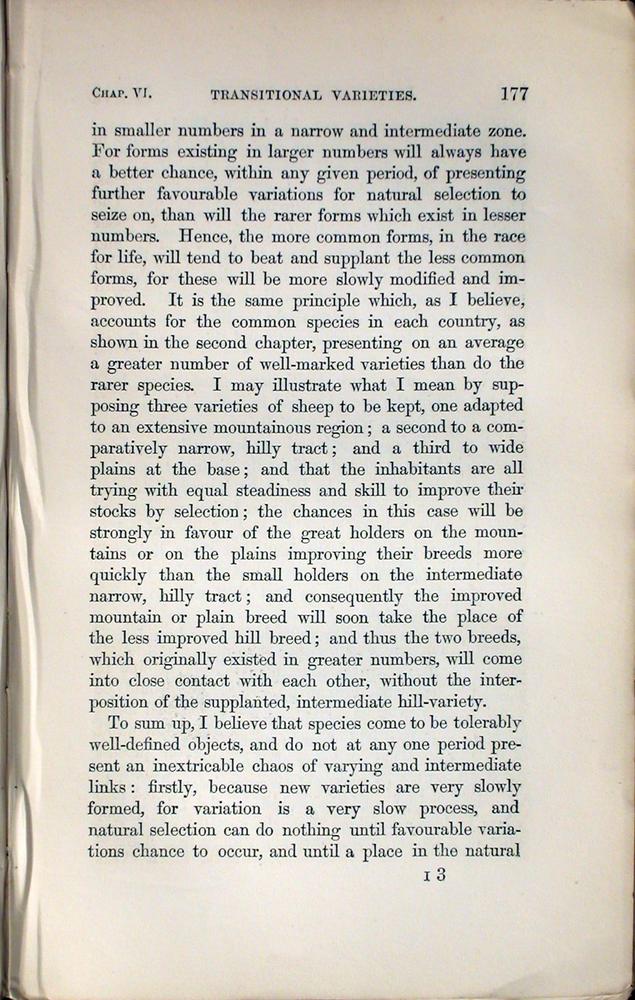 Argument from
Design
Argument from
DesignArgument
Courses 1
Courses 2
Courses 3
Darwin and the Argument from design
contemporary evidence | Who was Darwin? | Darwinian synthesis | Revolutiion | One Long Argument
"The argument for design, that is, the contention that all the multitudinous adjustments of organisms to their environment were evidence of the direct hand of God in earthly affairs, had been vigorously promoted through a long series of theological naturalists..."
Eisley, Darwin's Century, p. 175-76.
On the Orgin of Species | Consensus versus anomalies | Paley | Paley's influence
 |
|
|---|---|
|
|
|
|
|
|
|
|
|
|
|
|
|
Comic ridiculing Darwin's theory of descent. |
![]()
William Paley's Natural Theology, 1802
- nature as the expression of God's reason
- Bridgewater treatises, 1830s
"an increased human faith in Divine Providence."
"Nor ought we to feel our situation insecure. In every nature and every portion of nature which we can descry, we find attention bestowed upon even the minutest parts. The hinges in the wings of an earwig and the joints of its antennae, are as highly wrought, as if the creator had nothing else to finish. We see no signs of diminution of care by multiplicity of objects, or of distraction of thought by variety. We have no reason to fear, therefore, our being forgotten, or overlooked, or neglected."
William Paley, Natural Theology, London: 1836 Vol 2., p. 202; quoted in Eisley, Darwin's Century, p. 176.
Paley's Principle: "no species can develop any structure
of function that exclusively benefits any other species except its own
"
Consensus versus anomalous knowledge:
| Consensus | vs | anomalies |
|---|---|---|
| Fixity of species | huge variety of domesticated breeds | |
| Superiority of races | dark skinned Caucasians in India | |
| No extinction of species | Fossil species both like & unlike current species |
Fixity of species meant that once created, in the past, the creatures on earth had never changed. This supported the ideal of special creation.
To further complicate matters the geological evidence split thinkers into two main groups:
Catastrophists who believed great global upheavels had occured to alter life on earth, and thus create fossils (great floods) and
Gradualists who believed in the long, slow process of change occurring gradually. Thesy believed in the dictum: "Natura non facit saltum." That meant "nature makes no great changes" or takes big jumps, instead it changes in mild and very small intervals.
Paley authored Natural Theology (1802)
“…are as highly wrought, as if the Creator had had nothing else to finish.…We have no reason to fear, therefore, our being forgotten, or overlooked, or neglected.”
Natural history was at this time used to sustain Christian faith and comfort the bereaved. There was a general conception of God as a kind of master workman who had personally supervised the creation of even the tiniest organism of the living world.”
Ernst Mayr suggests that:
"evolution in a way contradicts common sense."
"It required a veritable intellectual revolution before one could even conceive of evolution."
"Curiously, it was theology, in the form of natural theology, which prepared the way for evolutionary thinking to a far greater degree than philosophy."
"The reformation represented a definite set-back for evolutionism,… Protestantism reinforced the authority of the Bible…. Liberal interpretations, such as St. Augustine, were now totally rejected."
The Growth of Biological Thought, (1982), 309.
![]()
William Paley wrote his influential book Principles of Moral and Political Philosophy (1785) which he based on the assumption that God desires the happiness of His creatures and rewards or punishes them after death. The book advocates a form of utilitarianism.
“Paley made Naturalists, Darwin was one of them.”
“Darwin once remarked, ‘I do not think I hardly ever admired a book more than Paley’s Natural Theology. I could almost formerly have said it by heart.’ ”
Paley used the eye as an example of perfection. Then Darwin, in chapter six, used the eye as evidence for natural selection’s power to exquisitely shape organs. Yet Helmholtz, 50 years later, said the eye was a poor optical instrument!
Hardin, Nature and Man’s Fate, pp, 58-59.
William Whewell is also widely regarded as the father of modern philosophy of science. He was the most renowned of the writers of the Bridgewater Treatises in the 1830s, a Royal Society-organized collection of essays connecting religion/mysticism and science -- what was then known as "natural theology". Loosely, Whewell's basic argument was that knowledge of the world is acquired because there are "fundamental" and uniform laws of science which we are able to discover. Whewell took this as evidence of the existence of a divinity to provide such uniformity. These underlying scientific laws of the world are precisely the "Ideas" that God used in his creation of it. Taking it a step further, Whewell went on to argue that science, by "discovering" these laws, was itself a providential task as it brought men closer to understanding the majesty of God's design.
Galileo | Gell-Mann | Geoloical time scale | Darwin | Mayr | Tattersall | Keller | Lewontin | Margulis | RNAi


